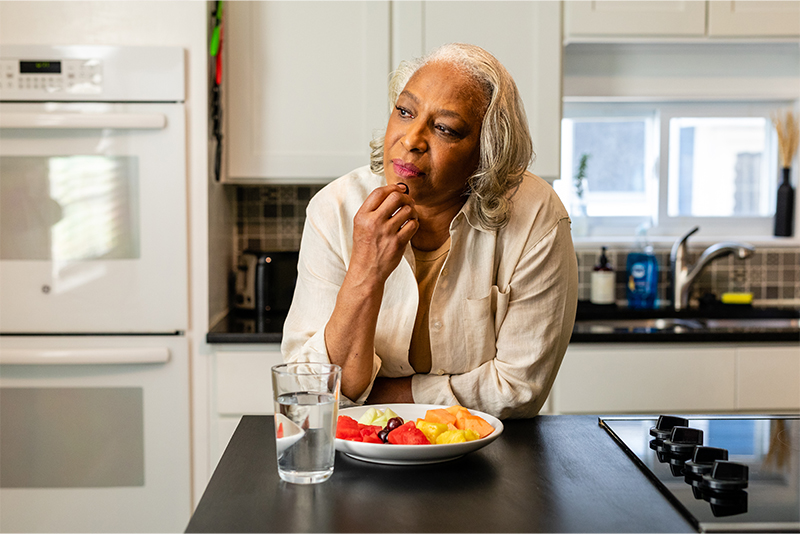Struggling to Let Someone Lighten Your Caregiving Load? This Might Be Why.


Learn why it’s so important to allow someone to help lighten your caregiving load, and why you may be feeling so resistant to the idea.
The moment Mom is discharged from the hospital, you exhale, believing the toughest part is finally behind you. But instead of bouncing back, she seems drained, anxious, or even weaker than before. She’s struggling with simple tasks, isn’t sleeping well, and feels overwhelmed.
This wasn’t how you pictured recovery. Instead of a turning point, it feels like she’s slipping backward.
What’s going on?
The Unexpected Challenge of Post-Hospital Recovery
Leaving the hospital doesn’t always mean the body is ready to heal. Many older adults experience post-hospital syndrome—a state of extreme stress and vulnerability that can slow recovery, lead to new health complications, and even increase the risk of readmission.
Stress plays a bigger role than you might realize.
How Stress Slows Healing
A hospital stay is more than just physically exhausting—it’s mentally and emotionally taxing, too. Sleepless nights, unfamiliar routines, constant noise, and medical procedures can leave a person feeling depleted. And that stress doesn’t disappear the moment they walk through their front door.
Here’s how lingering stress can work against recovery:
- Weakened Immune System: Stress suppresses the body’s ability to fight off infections.
- Delayed Healing: High stress hormones can slow the body’s ability to repair wounds or recover from surgery.
- Disrupted Sleep & Appetite: Poor rest and inadequate nutrition make regaining strength even harder.
- Inactivity & Physical Decline: Fatigue and overwhelm may discourage movement, leading to muscle loss and increased fall risk.
- Higher Risk of Readmission: Research shows that patients struggling with post-hospital stress are more likely to be readmitted within 30 days.
So, what can you do to help a loved one recover in a way that truly supports healing?
Reducing Stress and Supporting a Smoother Recovery
It’s overwhelming to see a family member struggle after a hospital stay, especially if you’re balancing caregiving with other responsibilities. The good news? Taking a few proactive steps can make a big difference.
1. Create a Stable, Comforting Environment
After days of constant monitoring and unpredictable schedules, your loved one needs peace and routine. Keep meal times, medication schedules, and daily activities consistent. Minimize background noise, maintain a comfortable room temperature, and make sure essential items are within easy reach.
2. Balance Rest and Gentle Activity
While rest is necessary, too much inactivity can lead to stiffness, weakness, and a decline in overall health. Even small movements—like standing up, taking a few steps, or stretching—can help prevent muscle loss. If mobility is a concern, having a caregiver assist with safe movement can reduce the risk of falls.
3. Ensure Proper Nutrition and Hydration
After hospitalization, appetite often declines due to fatigue or stress. But the body needs nutrients to heal. If preparing meals is overwhelming, consider bringing in a home care provider to assist with meal prep and hydration reminders. Even simple, nutrient-rich snacks throughout the day can help rebuild strength.
4. Address Anxiety and Emotional Well-Being
Many older adults worry about getting sick again or losing their independence after a hospital stay. Encourage open conversations about their fears, provide reassurance, and, if needed, seek emotional support through counseling or companionship services. A home care provider can offer emotional support and social interaction, easing feelings of loneliness and worry.
5. Bring in Extra Support
Trying to do everything on your own isn’t just exhausting—it can slow down recovery for both you and your loved one. Professional home care services can provide much-needed relief by:
- Assisting with personal care, like bathing, dressing, and grooming
- Helping with medication reminders to prevent missed doses
- Supporting mobility and safe movement
- Preparing nutritious meals and ensuring proper hydration
- Offering companionship to reduce isolation and anxiety
- Giving family caregivers a chance to rest and recharge
You Don’t Have to Do It Alone
Caring for someone after a hospital stay is demanding, and burnout can make it harder to provide the support they need. That’s where Hired Hands Homecare comes in. Our specialized post-hospital care can ease the transition home and help ensure a smoother, less stressful recovery.
Call us at (866) 940-4343 to learn more about how we can support your loved one in San Rafael, Novato, Petaluma, and throughout the Bay Area.







Leave a Reply